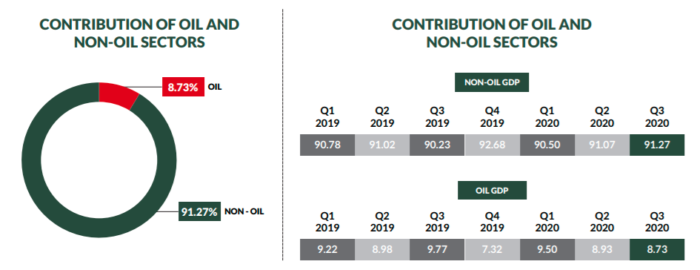Nigeria is the 15th oil-producing country in the world. While the amount of oil that the country produces currently stands, at 1.67 million barrels per day, you will be very wrong to think that the Nigerian economy is just about oil.

oil production per day in Nigeria
Data from the Nigerian Bureau of Statistics will be used to compose this article. And we will also provide you with info not only about the major sectors of Nigeria’s economy. We will also tell you their contribution to the GDP using 2020 as the benchmark.
Broadly, the Nigerian economy can be divided into the oil sec

Contribution of oil and non oil sector the Nigerian economy
tor and the non-oil sector. As you know, the oil sector simply involves the production and sale of oil. And this contributes about 9% of the Nigerian GDP.
The non-oil sector on the other hand is driven by a number of sectors and the major contributors are: information and communication, agriculture… basically crop production, construction, financial and insurance, as well as public administration and real estate.
The non-oil sector of the Nigerian economy contributes about 91% to the country’s GDP. However, this is not the reason why you opened this link as I will now proceed to discuss and break down the major economic drivers of Nigeria.
Major economic sectors of Nigeria
1. Mining and quarrying sector
This consist of crude petroleum and natural gas, coal mining. There is also metal mining as well as quarrying and other minerals activities. This industry contributes about 9% to the nations. GDP.
2. Agriculture
The crop production, livestock farming forestry as well as fisheries agriculture contributes about 30.77% to the overall GDP of the country. By a wide margin, the crop production sub-sector is the main driver of the agricultural sector.
3. Manufacturing sector
The manufacturing sector is comprised of a whopping 13 industries or subsectors. These are: Oil Refining; Cement; Food, Beverages and Tobacco; Textile, Apparel, and Footwear; Wood and Wood products; Pulp Paper and Paper products; Chemical and Pharmaceutical products; Non-metallic Products, Plastic and Rubber products; Electrical and Electronic, Basic Metal and Iron and Steel; Motor Vehicles and Assembly; and Other Manufacturing.
This sector contributes about 9% to the country’s GDP.
4. Electricity, gas, steam, and air conditioning supply
This sector contributes to the tune of 0.3% to the nation’s GDP and it involves the generation of electricity and other byproducts in order to provide power to the economy.
5. Construction industry
Involves the building of roads, and other infrastructure products in the country and this sector contributes about 3% to the GDP of the country.
6. Trade sector
The trade sector contributes about 14% to the nation’s GDP and it involves wholesale and retail trade of goods, within a country and also outside the country paragraph.
7. Accommodation and food services
This sector contributes about 0. 7% to the GDP of the country. The accommodation sector involves the rental of homes while the food services involve the cooking and sale of food and auxiliary culinary services.
8. Information and communication
This sector has four other subspecies which are publishing motion, picture sound recording music, production, and broadcasting. And it contributes 13% to the countries GDP.
9. Transportation and the storage sector
This sector has about six other activities. These are rail transport. Road transport water, transports, air transport services, and posts.
This sector contributes about 1% to the GDP of the countr.
10. Arts, entertainment, and recreation sector
The overall GDP contribution of the sector is about 0.1% and it involves the sale of art products and also recreational activities and other forms of entertainment.
11. Real estate services
which involves the construction of houses and other industrial buildings for people. And this is a booming sector of the Nigerian economy which has now contributed to over 5% to the real GDP of the country.
12. Finance and insurance sector
Nigeria has some of the best banks in Africa, and also insurance companies. It contributes to over 2% of the GDP of the country.
13. Administrative and support services
It’s actual contribution to the GDP of the country is to the tune of 0.02%.
It is a vital part of the makeup of the country.
14. Professional, scientific and technical services
This sector contributes to our 3% to the aggregate GDP of the country.
15. Education sector
This involves the building of schools: primary, secondary, and university and other education-related activities. It contributes about 1.5% to the real GDP of the economy.
16. Public administration
The public organization is the implementation of all policies as set out by the government of a country and it is a useful academic discipline. This sector has contributed to over 2% of the GDP of Nigeria.
17.Human health and social services
The contribution of this sector is over 0.5%, as at 202.
18. Water supply sewage with management higher mediation sector.
And this is about the last sector major, contributor to the economy and GDP of Nigeria.
Abbey Johnson has a Masters degree as an engineer and has over 3 years of teaching and research experience. He is happiest when on a bike and is also interested in electric energy and computer Science.

